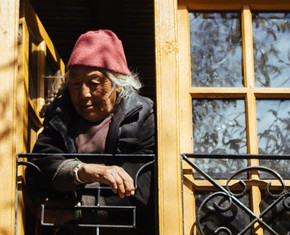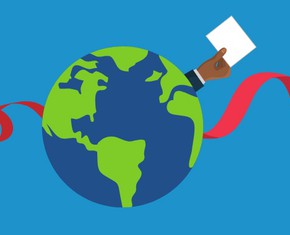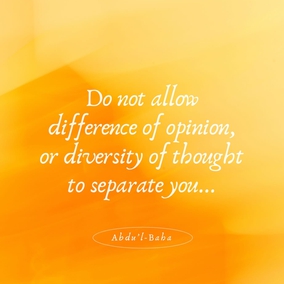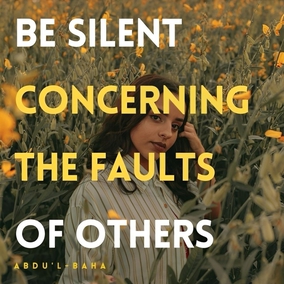The views expressed in our content reflect individual perspectives and do not represent the authoritative views of the Baha'i Faith.
A single person can’t help but look at the scale of economic injustice in the world and not feel at least a little bit overwhelmed at the staying power of the status quo.
I, for one, was born on stolen land, in a hospital dominated by profit-seeking interests, electrified by power plants slowly enveloping the Earth in greenhouse gases, to a family of people who knew their places in that society and who performed their roles accordingly. I was born a stranger to this scene. But it was there waiting for me, a world steeped in a history that would long outlive me.
It seems to me that the moral predicament of the individual is to do what is right and just in a social environment that has been doing the opposite for such a very long time.
In a recent message, the international governing body of the Baha’i Faith, the Universal House of Justice, calls on us to explore wide-reaching approaches to social and economic transformation.
However much such conditions are the outcome of history, they do not have to define the future, and even if current approaches to economic life satisfied humanity’s stage of adolescence, they are certainly inadequate for its dawning age of maturity. There is no justification for continuing to perpetuate structures, rules, and systems that manifestly fail to serve the interests of all peoples. –The Universal House of Justice, 1 March 2017.
Systemic change requires much more than the meager options typically allowed individuals. It can’t just be bought off a shelf. Masses of people have to work together to make it happen—in villages and cities, in governments, schools, businesses, and other spaces. Baha’u’llah’s vision for humanity emphasizes cooperation and mutual assistance. By living and acting in oneness we form a collective agency capable of making the economy advance the prosperity of all people. So even though I was born on stolen land and I was rapidly socialized into an unjust economy, our joining together with others allows us to get our hands around the economic behemoth, change the rules, and make it work for everyone.
This vision stands in contrast to the choices mainstream society offers us.
One symptom of our unequal economic system is that our culture presents such a narrow range of ways to remedy the exploitation, environmental devastation, poverty, and insecurity that it creates. For example, if an industry we work in is corrupt, we are told we can exercise our moral agency by pursuing a career somewhere else. If a manufacturer treats its workers poorly, we can purchase a more expensive product from a company with fewer ethical problems. We can refrain from soliciting bribes and try our hardest to avoid paying them. These individual moral choices, no matter how noble, do little to change entire systems.
At the same time, powerful organizations with national and international influence pass up opportunities to reform fundamental features of the economy. The burden of improving society is placed on the individual, who can’t help but look at the global economy the same helpless way someone would a towering mountain range or a dark storm gathering on the horizon.
As individuals we are not powerless. But we need to pursue whatever we do within the context of a larger vision of social change we share with others in order to be effective. We must recognize that the decisions and behavior of individuals, companies, and nations are not determined in a vacuum. They are embedded in a dense web of social, economic, and political institutions constructed to amass enormous private fortunes for those who are already rich. Trying to persuade individuals here-and-there in positions of power to do the right thing is not enough. What they think and want as individuals is a small piece of the puzzle. Redirecting broader social forces from injustice towards justice must be the larger goal.
Getting there takes time. A seed does not grow into a tree all at once. All the possibilities of a new approach cannot be manifested immediately. The process unfolds in stages propelled by its gradually mounting power. For this reason, the Universal House of Justice presents the emergence of a new economic system as a milestone in a long process of spiritual evolution:
Although Baha’u’llah does not set out in His Revelation a detailed economic system, a constant theme throughout the entire corpus of His teachings is the reorganization of human society. Consideration of this theme inevitably gives rise to questions of economics. Of course, the future order conceived by Baha’u’llah is far beyond anything that can be imagined by the present generation. Nevertheless, its eventual emergence will depend on strenuous effort by His followers to put His teachings into effect today. –Ibid.
The Universal House of Justice recognizes that while the world for now is hemmed in by systems producing massive inequality, there is still a path to the reorganization of human society—and people’s strenuous efforts to apply Baha’u’llah’s teachings help us to walk it:
Every choice a Baha’i makes—as employee or employer, producer or consumer, borrower or lender, benefactor or beneficiary—leaves a trace, and the moral duty to lead a coherent life demands that one’s economic decisions be in accordance with lofty ideals, that the purity of one’s aims be matched by the purity of one’s actions to fulfil those aims. – Ibid.
In this connection, the words of Baha’u’llah guide us in the right direction, economically and spiritually:
Be generous in prosperity, and thankful in adversity. Be worthy of the trust of thy neighbor, and look upon him with a bright and friendly face. Be a treasure to the poor, an admonisher to the rich, an answerer of the cry of the needy, a preserver of the sanctity of thy pledge. – Baha’u’llah, Gleanings from the Writings of Baha’u’llah. p. 285.
Baha’i-inspired efforts to transform the economic life of humanity are at a very early stage of development. As we learn to apply our individual moral agency we develop habits, attitudes, and skills that will prepare us to join together in oneness with all humanity to rewrite the rules and realign the frameworks that structure the global economy.
















Comments
Sign in or create an account
Continue with Googleor